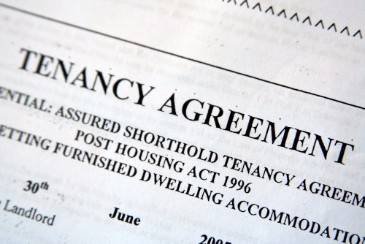Are you struggling with tenancy issues? Don’t let your tenants take advantage of you and your property. Give our New Jersey lawyers a call.
Written vs. Verbal Lease Agreements
 Obviously, verbal agreements are those agreements that are not in writing – and they are virtually unenforceable in a Landlord-Tenant Court, except for the payment of rent because you can generally substantiate the payment of rent by keeping written receipts, showing the manner in which the payment is made. Without a written lease, the landlord is going to have serious difficulties trying to evict a tenant for other violations – at least what the landlord deems to be violation of the tenancy.
Obviously, verbal agreements are those agreements that are not in writing – and they are virtually unenforceable in a Landlord-Tenant Court, except for the payment of rent because you can generally substantiate the payment of rent by keeping written receipts, showing the manner in which the payment is made. Without a written lease, the landlord is going to have serious difficulties trying to evict a tenant for other violations – at least what the landlord deems to be violation of the tenancy.
Tenant Only Paying Part of Rent
If a tenant pays only a portion of the rent that’s due, the landlord should accept that rent. However, the landlord should then seek proper counsel and file an eviction complaint against the tenant. If the landlord has a lease that designates all enforcement payments as additional rent, the landlord will be able to recover – not just the rent that’s owed – but also any late charges and fees, such as attorney fees and court costs the landlord had to incur in order to bring the tenant to court and successfully recover rents that are owed.
Tenant Refuses to Pay Rent
Non-payment of rent is the most common tenancy action that takes place in Landlord-Tenant Court. If the landlord has a lease with an additional rent clause, the landlord can file suit to evict the tenant in the Landlord-Tenant Court, and may also seek to recover all legal costs related to that, as well as any late charges. The tenant must provide an adequate reason why the rent wasn’t paid – such as not having access to the apartment, or damage or defects in the apartment in some manner that would cause a reasonable person not to pay rent. Unless a tenant can show that, then the tenant is going to be evicted. A judgment for eviction will be entered in favor of the landlord, and the landlord may proceed to have the tenant locked out of the premises.
Tenant Broke Lease
When a tenant breaks a lease, the landlord has access to several remedies. First, the landlord can file a Civil Action against the tenant to seek payment of rent that would have been paid had the tenant complied with the lease. The landlord does, however, have an obligation to mitigate damages. For example, if a tenant breaks a lease with, say, four months left, the landlord can’t simply sue the tenant for the four months’ rent. First, the landlord must make reasonable efforts to rent the premises, and he must be able to document those efforts. Once the landlord makes that effort – but is not successful – he can seek to have the tenant pay all the monies that would have been paid under the lease, had the lease not been broken.
Landlord Tenant Courts
All landlord-tenant matters are heard in the County Superior Court, in the Special Civil Part Section of the respective county court.
The state of New Jersey recognizes three categories of tenants – commercial tenants and two categories of residential tenants. New Jersey statute N.J.S.A 2A:18-53A generally addresses tenants that occupy owner-occupied premises where there are no more than two rental units in addition to the one in which the owner resides. Those tenants have far fewer rights than the majority of tenants – those who fall under N.J.S.A 2A:18-61.1. That statute is called the Anti-Tenancy Eviction statute, and for very good reason. The essential purpose of that statute is to protect tenants from unwarranted evictions.
In the first category – the owner-occupied tenancies – the landlord can simply terminate a tenancy once the lease has completed. In the case of a month-to-month tenancy, the landlord can serve a 30-day notice and terminate the tenancy. Under the Anti-Tenancy Eviction statute, however, so long as the tenant pays rent and does not violate the terms of the lease, they cannot be evicted. In other words, the mere fact that a landlord simply doesn’t like the tenant and doesn’t want to continue to be their landlord is not a reason to evict the tenant. The tenant can only be evicted for just cause – and that’s going to be a violation of the lease or failure to pay rent.
Download Our Free Landlord Guide
Being a landlord or property manager can often accompany legal problems. Don’t let your tenants take advantage of you! If you need help creating a lease or dealing with a problem tenant, contact our experienced New Jersey Landlord Tenant Lawyer Brian Freeman for a free consultation.
Subscribe to Our YouTube Channel
